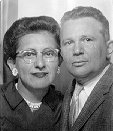 Anti-Semitism Sent Him To America
Anti-Semitism Sent Him To AmericaFred Fedrid
This is part of an ongoing series of interviews with deaf survivors of the Holocaust during World War II.
Eleanor Comer of Edmonds, Washington wrote this column about her father, Fred Fedrid.
Here is a summary of my father’s story according to his diary and notes.
Siegfried ‘Fredf Fedrid was born in April 1920 to Rosa and Karl Fedrid, both of whom were congenitally Deaf. Rosa was a homemaker and Karl worked in a shoe repair factory. Both had graduated from the schools for the Deaf in Vienna, as did Fred in 1936. At 16 years old, he was an apprentice in a custom tailor shop, though his training was interrupted when the Nazis forced the owner of the shop to leave his business in December, 1938.
In October, 1941, the Gestapo arrested Fred and his family at their home and brought them to a pooled school. The Nazis segregated the Deaf people from the others. Not wanting the Nazis to select them in this way, knowing it could only mean hardship or worse, Fred and his parents kept their hands to their sides. Thus, they were not deported to the camps in the east. They stayed at the school a few days for inspection then went by train to the Lodz ghetto. They left behind their personal possessions, furniture and a stamp collection worth 10,000.00 Schilling.
After three months in the ghetto, Karl died of hunger and his body was frozen. Rosa died the following August from starvation.
 A few days after Rosa died, the SS herded all the Jews of the ghetto onto the big square then sorted them out to be liquidated. After this liquidation, there was plenty of jobs open. Fred then worked in a uniform tailor shop in Lodz from September 1942 to July 1944. The SS forced him to make the uniforms for the Nazis.
A few days after Rosa died, the SS herded all the Jews of the ghetto onto the big square then sorted them out to be liquidated. After this liquidation, there was plenty of jobs open. Fred then worked in a uniform tailor shop in Lodz from September 1942 to July 1944. The SS forced him to make the uniforms for the Nazis.
In the summer of 1944, when the Nazis were in the final stages of liquidating the Lodz ghetto, Fred was deported to Auschwitz. From there, Fred was among other prisoners who were deported to Dachau and its subcamps. Fred was given a metal pin to wear the shape of an inverted red triangle. It bore his number and was imprinted with the word ‘Taubstummen.’ In this way, the guards would know he was Deaf and would not shoot him when he did not immediately respond to their commands.
On Wednesday, April 25, 1945, the SS were despairing because the Allies were near Camp Kaufering. They forced all prisoners to fall in for roll call and sorted out who were able to walk and put them in one corner. In another corner, they put the sick ones who were unable to walk; these prisoners were either shot or burnt alive.
 Fred marched three days and two nights without food or drink. Many prisoners died on the way. When they got to Dachau, the SS general said that the gas chambers were overfilled and there was no room for these prisoners. They ordered them to march to another subcamp, Allach at Munich. It was between Friday night and Saturday morning, April 27th and 28th, 1945. From April 25 to April 28, Fred did not eat or drink. From April 29 to May 8, he lived only on black coffee.
Fred marched three days and two nights without food or drink. Many prisoners died on the way. When they got to Dachau, the SS general said that the gas chambers were overfilled and there was no room for these prisoners. They ordered them to march to another subcamp, Allach at Munich. It was between Friday night and Saturday morning, April 27th and 28th, 1945. From April 25 to April 28, Fred did not eat or drink. From April 29 to May 8, he lived only on black coffee.
On May 8, the American army freed Fred and brought him into Camp Feldafing. American doctors and personnel took good care of Fred. He stayed there for about 20 days then decided to join the Austrian DP camp in Munich at Bazailles School until October 10, 1945.
When Fred went back to Vienna to look for friends and relatives, the people told him that the SS confiscated all of his possessions that Fred and his parents had left behind. They said the SS sold them. He had lost everything. When he met his Deaf friends, they said they were surprised to see he was still alive. ‘You’re a Jew and you’re Deaf and you’re alive?’ From then on, Fred was wary of these people and refused their offers of food or drink.
Fred worked at a custom tailor shop, lived in a rented room and supported himself. It was very important to him to never rely on handouts or government subsidies to live. He wanted people to know that Deaf people are capable, intelligent, and able to support themselves financially.
Fred immigrated to New York where his mother’s sisters and brother lived. He met Doris Rosenstrauch, also a Holocaust survivor, at a citizenship class for the Deaf, sponsored by the New York Society of the Deaf. Fred and Doris married and moved to Denver. They have three hearing children, Charles, Rose, and Eleanor. Fred died in 1963. Doris, who has Usher’s syndrome, lives in Seattle, Washington where there is a large deaf-blind community and support services.
Eleanor is writing a book about both her parents’ lives before and during the war. If you knew either Fredor or Doris in Europe or America, please contact Eleanor at [email protected]





